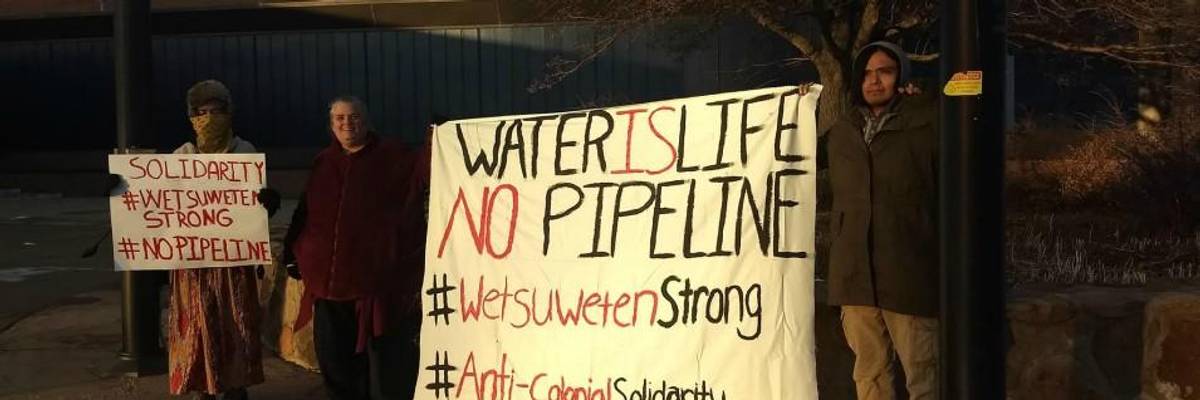The right to protest is an important part of Canadian democracy and the right to free expression.
Section 2 of the Canadian Charter of Rights and Freedoms guarantees the freedom of expression, freedom of association, and the freedom of peaceful assembly. Protests are a way for people to express themselves for or against decisions made by government or other powerful institutions. People have taken to the streets throughout history to stand up for what they believe in.
But more and more, we are seeing examples of this freedom of expression being criminalized. Companies and corporations are obtaining court orders and bringing in the police, who are using physical force and arrests to criminalize dissent and silence protestors.
We saw it happen in Montebello, Quebec as thousands of people gathered to protest the proposed Security and Prosperity Partnership as then-prime minister Stephen Harper met behind closed doors with his U.S. and Mexican counterparts. We saw it in 2010 at G20 protests in Toronto as riot police used excessive physical force to round up and detain protestors. (And it's worth noting that federal Public Safety Minister Bill Blair was Toronto's chief of police during this time.) Indigenous Peoples have also faced police force when protecting land and water.
Right now, Wet'suwet'en Hereditary Chiefs and land defenders are protecting their unceded territory from construction of the Coastal GasLink pipeline, which if constructed, would send fracked gas to a terminal on the coastal shores. Members of the First Nation have a right to say no to development, especially when it brings the threat of a spill that could result in serious environmental damage to the land and water. The Wet'suwet'en have a camp and buildings in the area, are hunting and trapping animals, and living off the land, peacefully occupying their territory.
The RCMP recently set up a perimeter and appears to be preparing to enforce a court injunction to evict these Indigenous Peoples from their land. One year ago, RCMP officers violently confronted Indigenous Peoples in the same location - and there is real concern in will happen again.
Then, this week in Regina, labour activists from Unifor who set up a peaceful and legal picket line in front of Co-op Refinery Complex were confronted by dozens of police officers from the Regina Police Service. Video of the confrontation show police forcibly removing protestors. There are also reports of one protestor being struck as police moved a vehicle. Fourteen people were arrested, including Unifor President Jerry Dias.
It was recently revealed the police action happened the same day the Regina Police Service received a letter from the head of the local trucking company calling for action.
"I've been walking picket lines for over 40 years and there is one common role for police and that is to ensure situations do not escalate," said Dias the day after his arrest. "This is not what happened last night. As a matter of fact, police showed up and it was clear the sole purpose they were there was to escalate the situation and that's what they did."
He said more Unifor members and labour activists from other unions will be joining the line to fight for workers' right to bargain. Co-op, a company that pulls in $3 million in profits every day, has locked refinery workers out after they refused to accept cuts to their pension plan. Unifor has vowed to stop Co-op from continuing work at the refinery and has set up a picket line to block the entrance. The company continues to fly scab workers and management into the facility by helicopter.
"Since the arrests last night, our members are flying in from across the country in droves to get here to Regina, because they're not going to watch the police bully and push around our members," Dias said in an interview with media.
According to the Regina Leader-Post, in a statement, Labour Relations Minister Don Morgan said he spoke to both sides in the labour dispute to convey that the government believes "the best agreements are reached through bargaining." Unifor has stated it is prepared to return to the bargaining table - the company is not.
"While our government is concerned with the increasingly aggressive tactics being used in this labour dispute, we are encouraged by the Regina Police Service's diligence in upholding the law and keeping the peace," said Minister Morgan, giving tacit government approval for the police's forceful actions.
The Council of Canadians is concerned with the growing trend of police force being used to disrupt or stop peaceful protests. Indigenous Peoples have the right to self-determination. Workers have the right to protect their jobs and benefits, to bargain disputes at the bargaining table - and when that doesn't work, to strike. People across the country have the right to take to the streets to speak out against the actions - or inaction - of our governments and other powerholders.
Our democracy is at risk if our right to peaceful protest is taken away.




